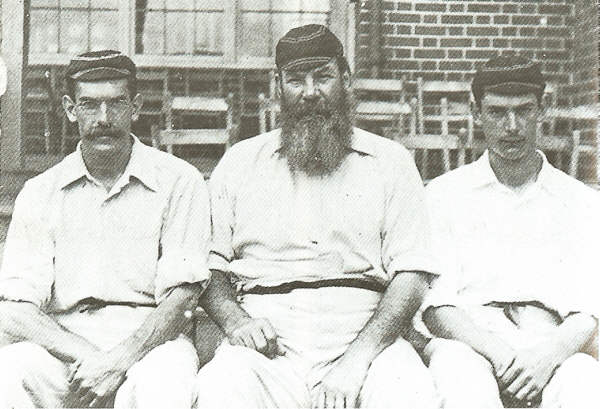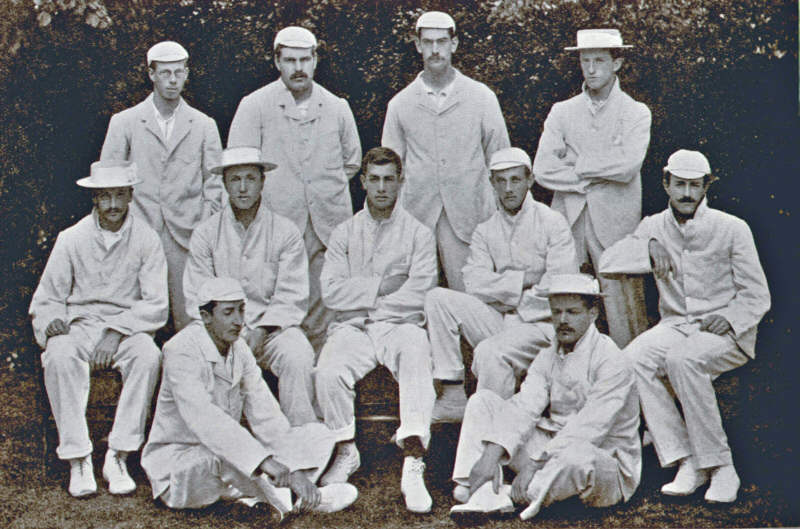 |
Clifton Rugby Football Club History |
|
|||||
|
William Gilbert Grace Jnr |
|||||||
ADVERTISE ON THIS WEBSITE |
Home Founders Benefactors Famous Players Famous Matches Grounds War Memorial In Print Statistics Other Sports Info B In Memoriam |
1860s 1870s 1880s 1890s 1900s 1910s 1920s 1930s 1940s 1950s 1960s 1970s 1980s 1990s 2000s B List of Club Members 1872-1945 B Club Statistics 1872-2011 |
He was born on the 6th July 1874 in West Brompton, Kensington, London. His father was, perhaps, the most famous cricketer in history. He was educated at Clifton College from 1887 to 1893 and Pembroke College, Cambridge. He played cricket for Cambridge University, twice a cricket blue in 1895 and 1896, Gloucestershire and London County.

Above centre, W.G.Grace with his eldest son left, W.G.Grace Jnr, and his youngest right, Charles Butler Grace.

Above W.G.Grace Jnr.
He was a quiet man. He didn’t get on well with his father, but it couldn't have been easy being the son of the most famous cricketer in the world. He could never live up to his fathers high expectations. His father took a great interest in his eldest sons sporting progress and would use his influence to better it. A notable Bristol athlete, J.W.S.Toms recalled:
'W.G.' was very keen for his son, joung 'W.G', to win the Public Schools' quarter-mile championship and asked me to help in the preparation. The training was on the County Ground and very drastic it was, too.'W.G.', believing in stamina, would make me run 350 to 400 yards all out. Then he would yell until the finish, 'Come on, lazybones!'
To 'W.G.'s' disappointment, his son was second in the fastest time recorded up to that date.
W.G. overdid the pressure when it came to cricket too. When his son was not picked for the University's match against the MCC at Fenner's, he picked him for the MCC instead. Father and son opened the batting for the MCC only for W.G. junior to suffer the humiliation of a duck. W.G. senior went on to score 139. To rub salt in the young man's wound, exactly the same thing happened in the return match at Lord's, he was dismissed without scoring and his father went on to make 196.
However, to his father's pride and delight, he managed to get his Blue the following year, performed creditably in the match, opening the innings and making 40 and 28. Unforntunateley for his final year and second Blue he made a pair against Oxford. As he trudged back to the Lord's pavilion after his second duck, his mother and sister, Bessie, who had made the journey from Bristol to watch him, sat in silence, tears streaming down their faces.
 |
| Back Row (L-R): H.Gray, J.Burrough, W.G.Grace, W.W.Lowe. Seated: C.E.M.Wilson, F.Mitchell, W.G.Druce, N.F.Druce, R.A.Studd. On Ground: H.H.Marriott, W.McG.Hemingway. |
Above the Cambridge Cricket XI of 1895
 |
| Back Row (L-R): H.H.Marriott, E.R.Shine, W.G.Grace, P.W.Cobbold. Seated: W.McG.Hemingway, N.F.Druce, F.Mitchell, C.E.M.Wilson, E.H.Bray. On Ground: C.J.Burnup, G.L.Jessop. |
Above the Cambridge Cricket XI of 1896
He didn't play much first-class cricket after that. It is said that he chose the job at Oundle School because it was the job furthest away from his father.
He was not well known for playing rugby but did so for Northants and East Midlands. He guested for Clifton in the first ever rugby match played on Buffalo Bill’s Field on the 23rd September 1893 against Bristol and also in the match v Llandaff City on the 4th January 1896 again on Buffalo Bill’s Field.
From 1897 until 1903 he was an assistant-master at Oundle, and during the last two years of his life he occupied a similar position at the Royal Naval College, Osborne.
He died suddenly on the 2nd March 1905 at East Cowes, Isle of Wight after an operation for appendicitis. He was buried at Elmers End Road Cemetery. His father was buried next to him 10 years later.